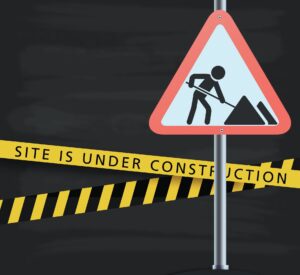Some elements of an author’s proposal are not what you’d think. They seem like a good thing, but may make the opposite impression from the one you’re looking for.
“I’m in the process of having a professional website created/updated.”
 What that really tells an agent or editor is that the author isn’t aware that one of the agent’s/editor’s first actions in going deeper if a proposal concept appeals is taking a look at the author’s website. If it is missing, under construction, or “in the process of being created,” the proposal submission is likely premature. It rarely happens that an author receives a contract without already having an active and engaged website in place. It is the writer’s primary home. If your website is outdated or non-existent, consider waiting to submit your proposal until it is functioning well and can offer an agent or editor a warm welcome to your primary online home.
What that really tells an agent or editor is that the author isn’t aware that one of the agent’s/editor’s first actions in going deeper if a proposal concept appeals is taking a look at the author’s website. If it is missing, under construction, or “in the process of being created,” the proposal submission is likely premature. It rarely happens that an author receives a contract without already having an active and engaged website in place. It is the writer’s primary home. If your website is outdated or non-existent, consider waiting to submit your proposal until it is functioning well and can offer an agent or editor a warm welcome to your primary online home.
“The longer the proposal, the better, right? More insights? Plenty of ways of telling what my book is about?”
It’s not what you think. A proposal that is repetitive (same info in multiple places), or adds many more sample chapters than the guidelines suggest, or one that includes a massively long synopsis or page-long chapter summaries earns a quick reputation as a proposal that is more work than the editor or agent has time to invest.
If an editor or agent wants to see more, they’ll ask for it. Offer a proposal that is simultaneously thorough and succinct.
“My past sales numbers are not great. If I don’t list them, the editor won’t know.”
Not what you think. Another early step for an agent or editor who wants to go deeper, learn more, is asking, “What else has this author written?” They can quickly discover those books you didn’t want to mention because of bad covers, lackluster reviews, or poor sales.
Be honest, but also be aware that self-published or small-press books that did not sell well are not stepping stones to something better. They are more often hurdles to overcome.
“This manuscript has been professionally edited by ______________.”
 How can that be a bad thing? Many authors believe the best they can do to make a good impression is to have their manuscript professionally edited. But what that tells us is how skilled the editor is, rather than how skilled the author is. Agents need to know the skill level of the author they’re offering to represent. Editors need to know if the author can replicate that manuscript’s level of excellence with their next book and the next.
How can that be a bad thing? Many authors believe the best they can do to make a good impression is to have their manuscript professionally edited. But what that tells us is how skilled the editor is, rather than how skilled the author is. Agents need to know the skill level of the author they’re offering to represent. Editors need to know if the author can replicate that manuscript’s level of excellence with their next book and the next.
Is editing sometimes useful and needed? Yes. When?
If the professional edit of a yet-to-be-contracted work is for flow, for grammar and punctuation, for typos, or for clarity, and if the edit is a classroom for the author, then it may be useful. The goal of a good edit is to equip the author to adapt healthy writing habits on their own. No author should count on leaning on an editor to clean up their work before it’s sent to an agent or acquiring editor. Count on learning. Count on growing in your craft. Depend on improving with each project.
We will ask, “How much of this manuscript reflects the editor’s work compared to your work? Can you show me a sample of a chapter before and after the edit?”
“You’re not saying a professional edit is wrong, are you?”
No! Professional editors are important in the process. And agents do sometimes suggest an aspiring author or even one of our current clients consider hiring a professional editor when a particular need arises. With a caveat.
When self-publishing, a professional editor is always recommended. With traditional publishing, your book will go through three to five rounds of edits after your manuscript is complete. A substantive or content edit, a copy edit, a line edit, and a galley edit/proofreading. But the cleaner the manuscript that’s turned in, the easier a process editing is for all involved.
Again, the people to whom you’re submitting need to know your writing style and ability, not a pre-contract editor’s.
We value and respect good freelance editors and their role. Be aware that their role isn’t to rewrite or co-write your book. An editor may polish your already shiny book, but in turn that should give you the tools to do more self-polishing the next time. Some freelance editors will disagree. It is, after all, their income producer, and they can offer beautifully beneficial insights. The key is not hiding behind an editor but learning from one, and offering the prospective agent or acquiring editor a clear picture of how well you write on your own. Ideally, that’s what’s replicable for future books.
Watch for more info in a few weeks that will help you make decisions about pre-contract editors, what kind of edit to ask for, how much you can be expected to pay for a pre-contract edit of different levels, and how to avoid other “It’s not what you think” advice you may have been given about your proposal.

 We Wish You a Blessed Thanksgiving!
We Wish You a Blessed Thanksgiving!
Engagement is not needed now,
a website’s just a faded dream,
and when I look on back at how
I approached all this, I scream.
Oh, dear Lord, I was naive,
and in that, arrogant.
I honestly (sigh!) did believe
that I could simply plant
my self-pubbed work on Amazon,
not needing to do more,
that hosts of readers would have gone
and beat path to my door.
I offer this self-crafted fail
as cringe-worthy cautionary tale.
For what it’s worth, there is a bit more to the self-destruction of my writing ‘career’ than merely self-publishing on Amazon with neither preparation nor follow-up.
The short version is that I wanted to write; I didn’t want to be a writer, and I could not see the difference.
The longer story, with your indulgence…
1) I wanted to tell stories that did not fit an established genre.
2) My style was archaic, written after authors I admired, from the 1930s through the 1970s and early 80s, people like Nevil Shute, Robert Ruark, William E. Barret, Susan Howatch, and Andrew Greeley. I didn’t like more recent fiction, and ignored the stylistic changes driven by a changing social and literary milieu.
3) My stories were Catholic, and not Christian. I did not at first see a difference, and after it was pointed out, willfully disregarded the disconnect out of mulish resentment.
4) I did not understand social media, and allowed a contempt for much of the dross I saw colour my feelings toward its potential.
5) I did not partake of online resources to hone my purportedly chosen craft. I liked the way I wrote, and figured I could develop on my own.
And that’s enough. I’m glad I tried; the two novels out there were well-received by the people who read them, and I am grateful for that. I enjoyed writing them, and even more, am grateful for the community I have found here.
There is another novel, finished…full of ghosts, sexism, racism, cultural appropriation, and Catholics. Don’t think that one’s gonna see the light of day, as I have something of an aversion to being burned at the stake by infuriated literati.
Andrew, I’m so glad you posted this “fuller” story of your writing journey. You’ve expressed something very important that many need to note. Writing for writing’s sake is a completely legitimate activity. Writing what may not be “popular” in the marketplace but writing anyway to satisfy your own passion for it and to reach others with it–in whatever sphere, large or small or even miniscule in our eyes–is always worth it.
WE GOT TO WRITE! We put words to paper (or digital) and arranged them in a pleasing tempo and with the messages of our heart laced in the invisible spaces between words and lines.
A multi-published, traditionally published author with more than dozens* of adoring fans (*most days it feels like a little shy of a dozen) fights a different battle–hanging on to the sheer joy of writing.
There’s a path for each of us.
Thanks so much, Cynthia! I especially love your tip about sending our own writing before it is professionally edited. I do want to know what editors and agents think of my writing, as it stands. So it is so good to know that the edits can wait! Of course, my critique partner helps me get my story ready to go. I’m certain you are not saying no to critique and self-editing, just to a professional edit, correct?
Correct! Critique partners and lots of informed self-editing!
“The key is not hiding behind and editor but learning from one…” Yes! As a freelance editor, I wholeheartedly agree with this gem. I started out writing, with the desire to be a published novelist. (I’ve published essays and short stories but no novels or nonfiction yet.) Time grew, and I realize now that my path is editing manuscripts and helping authors to see the deeper purpose in their ideas. To see their idea flourish is greater than the gifts between us.